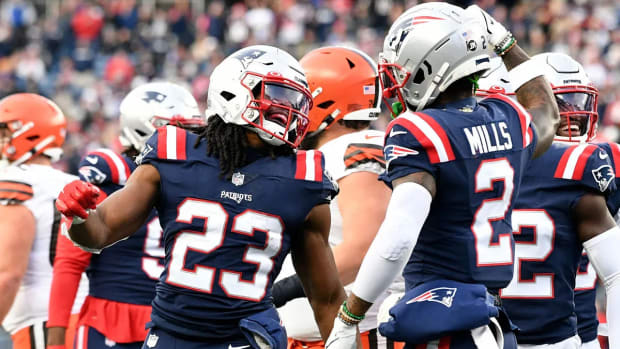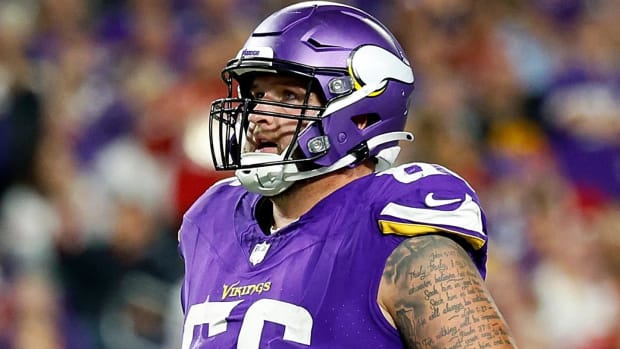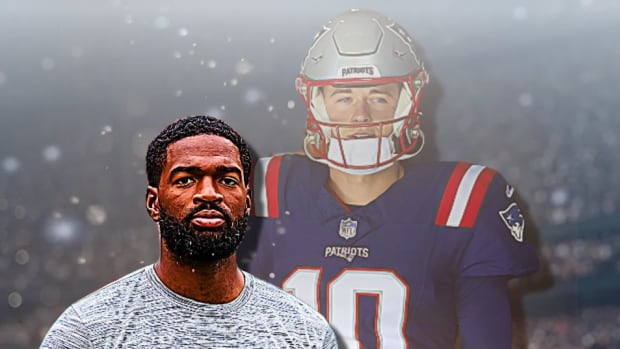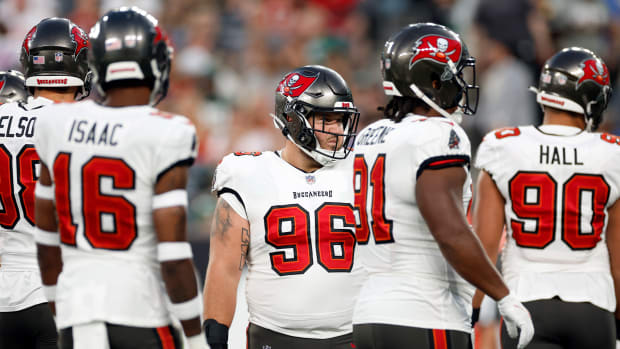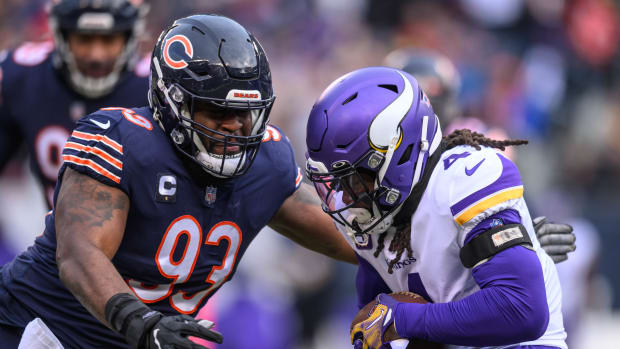Burke Report: How can NFL overtime be fixed? A few proposed changes
The divisional round was a quartet of entertaining games, all of which ended with one-possession differences on the scoreboard. But because the NFL can’t seem to stay out of its own way, the weekend also brought up the questions of what exactly constitutes a coin flip, and if the current overtime rules work (let's be honest—the latter is not exactly a new query).
There’s not much I can offer on the coin situation in the Packers-Cardinals game. NFL VP of officiating Dean Blandino told the NFL Network that while “the rulebook doesn't specifically state” anything about a coin’s trajectory, “common sense would dictate that the coin has to flip.” (Your thoughts, George Costanza?)
NFL conference championship picks: Top teams face off in ideal matchups
Common sense. Mind you, this is the league that had to form a “catch committee” so it could try to determine what is and is not a reception. Apparently, the shortest route to that answer is just to take all definitions of a catch out of the rule book. “Well, there’s nothing in the rulebook that tells us what a catch is, but common sense would dictate that ...”
Anyway, overtime. Let’s start with this: I don’t hate the current system. I certainly don’t love it, but I am among those who prefers it to the old sudden-death method. Among my arguments against it would be that it is too dependent on the aforementioned coin tosses, that both teams are not guaranteed possession and that the scoring rules are rather screwy—a field goal can’t win it until it can, etc.
So what might other options be? Allow me to pitch a few:
• Go back to Sudden Death: Just said this isn’t my favorite system, but at least it’s straightforward. First team to score, wins. That’s it. This does not check off the desire for both teams to have the football, but it does take out the current OT scoring requirements.
• Adjust the current system (aka The MMQB pitch): Here’s what The MMQB’s Peter King offered up as a possible solution in this week’s video mailbag: “I would be in favor of simply adding a tweak to the rule that even if the first team scores, I want the second team to have an opportunity to possess the ball.”
So, take that Green Bay-Arizona playoff game. The Cardinals scored a touchdown on the opening possession of overtime and won. Under the slight tweak, they would have had to attempt an extra point (or go for two) and then Green Bay would have gotten the ball back with a chance to match or better them. Presumably, if alternating first possessions still resulted in a tie, sudden death rules would kick in.
• KLEMKO: Why Bradley Roby will prove key as Broncos take on Patriots
But the idea that both teams should get the football, regardless of what happens, leads to ...
• Adopt a variation of college rules: In college football each team starts overtime by getting a possession from the opponent’s 25-yard line. (The rules are similar for most states’s high school games, though the ball often is bumped up to the 10.) If it’s still tied after the first overtime, they do it again alternating order—the offense that was on the field second in OT 1 goes first in OT 2. If it's still tied by the third overtime, teams must go for two-point conversions after touchdowns.
This has opened the door to some excruciatingly long overtime sessions, with Arkansas having twice played seven-OT games. The problem, again per Peter King, is “The NFL Players Association does not want to add a lot of plays to an NFL game.” This could do it.
One adjustment that could help: Back up the starting point. So, instead of giving teams the ball on the 25—well within field-goal range—put it at the 50. Games still could drag on, but there’s an increased chance of coming up with a defensive stop.
• DEITSCH: Brady-Manning rematch making CBS very happy
• Eliminate special teams: Get rid of the possibility of an overtime field goal and force teams to score touchdowns to win. If the NFL wants to keep it so both teams get a possession, throw out extra points and force offenses to go for two right out of the gate. (That idea also could play into the prior suggestion—don’t want for the third overtime before making the two-point conversation mandatory.)
Eliminating special teams also would force all offenses to go for it on fourth down, even if they’re backed up deep in their own territory. I’d say kickoffs can be up for debate; maybe those stay. If not, just assume a touchback and start possessions from the 20. Still want the ball first if you have to go 80 yards and can't punt?
• Just play an extra five minutes: FIFA is the most well-known organization with a similar rule. Whereas soccer used to have the “Golden Goal”—essentially, sudden death—it now employs a “Silver Goal” rule which stipulates that overtime must be played out in full, even if a team scores. Casual fútbol viewers may have seen this in action during the United States' World Cup loss to Belgium or during that tournament's final between Germany and Argentina.
Ch-Ch-Ch-Ch-Changes: Brady and Patriots’ offense are built to adapt
The idea here would be that the two tied teams merely play an extra, abbreviated quarter. However many points they can combine to score within the five-minute (or 10- or 15-minute) stanza would be it. A team runs out the clock and kicks a field goal? They win. No one scores? Tie. This could be adjusted for the playoffs, obviously, with another OT tacked on if the score was still deadlocked.
Limiting the action to five minutes also would prevent too many additional plays from going on the books. Another 15-minute quarter would be unwieldy, including from a TV perspective. This is short and sweet, plus doesn’t take the rules too far from where they are during regulation.
• Put both offenses on the field at the same time: Gotta throw out at least one nonsensical plan while we’re at it, right? But rather than worry about alternating possessions, just give each team the ball from the opponent’s 25 and see who scores a touchdown first. The team that reaches the end zone in the shortest amount of time wins. Think of it like the Double Dare Physical Challenge of overtime ideas.
If a team turns it over or fails to pick up a first down, it’s done for that overtime period and must hope the other team doesn’t score. As for the additional refs that would be required, well ... this is never happening, so stop nitpicking it.
Will either conference championship game be decided in overtime? I kind of hope not, but we'll see. Time to break down the matchups, before playing with a Mock Draft scenario and getting your thoughts on this week’s poll.
Four-man front
Here are four players I’ll be keeping a close watch on this week …
1. Bennie Fowler, WR, Broncos: If Fitzgerald Toussaint’s untimely fumble was the most important play in last week’s Pittsburgh-Denver game, No. 2 on the list was this: With Denver down one and facing a third-and-12, Peyton Manning hit Fowler for a 31-yard gain into Pittsburgh territory. Nine plays later, C.J. Anderson scored what would be the game-winning touchdown.
It was the biggest catch of Fowler’s career, and it came after he earlier had dropped two passes from Manning—on back-to-back snaps, no less.
The ties that bind the four head coaches left in the NFL playoffs
“Those two drops early, they are what they are,” Fowler said, via DenverBroncos.com. “At the end of the day, he still came to me. I had two catches, and he trusted me on a third-and-12 in the fourth. He threw me the ball and I made a play.”
The Broncos will need him again this weekend. In their win earlier this season over New England (30–24 in overtime), Emmanuel Sanders caught six passes for 113 yards while matched up mostly with Malcolm Butler. Demaryius Thomas, though, endured a brutal outing against Logan Ryan, catching just one of 13 targets with several drops. The Patriots can shade safety Devin McCourty over the top of either Thomas or Sanders, so Manning likely will have to spread the wealth down the pecking order.
Brock Osweiler turned to Owen Davis (five catches for 48 yards) and C.J. Anderson (four for 40) in leading Denver past the Patriots. Manning may lean toward Fowler, just as he did when his back was against the wall last week.
2. Marcus Cannon, OT, Patriots: Von Miller’s overtime sack of Tom Brady back in Week 12 came not against Cannon but against a combo of Sebastian Vollmer and Shaq Mason on the left side of New England’s line. Cannon more than held his own when pitted against Miller, a positive for the Patriots as they line up that head-to-head again.
The dish-washer in Ann Arbor who factors into Brady's weekly routine
Absent from the team’s earlier matchup was Denver OLB DeMarcus Ware. He turned in a sack and three QB hurries on Ben Roethlisberger last weekend and figures to hold his usual spot, which would put him opposite Vollmer to Brady’s blindside. Cannon will see Miller, who finished the regular season with 11.0 sacks and continues to be one of the most fearsome pass-rushers in all of football.
Working to Cannon’s benefit—and that of the entire New England line—is that Brady wastes little time uncorking the ball. Per CSN, Brady needed an average of just 1.94 seconds to release his 42 passes vs. Kansas City. To put that in perspective, Pro Football Focus had Brady as the NFL's quickest trigger during the regular season at 2.35 seconds.
“It’s quick,” Miller said. “We have to be tight in the secondary. That little window that we get, we ... have to get there.”
Miller can be lightning quick off the snap, and he'll have to be to take down Brady. Cannon will stand in his way.
3. Cortland Finnegan, CB, Panthers: No matter how you slice it, Finnegan is in for a test on Sunday. Signed only at the tail end of November, the veteran cornerback now finds himself playing heavy minutes along with Josh Norman and Robert McClain in Carolina's secondary.
He also lands in coverage against the opposition’s slot receiver, which means Finnegan will have to stick with either Larry Fitzgerald or speedster John Brown often Sunday. Fitzgerald has played 505 snaps from the slot this season with 53 catches, according to NFL.com. His versatility, in addition to his blocking prowess, has helped him stay a force for all these years. He’s a savvy route runner with size (6'3") and vice-like hands.
Brown presents a different challenge for the 5'10" Finnegan. He averaged 15.6 yards per catch this season and hauled in the team’s longest passing play (68 yards). Turn, and he’s gone.
Finnegan’s veteran presence has been a boost for Carolina—he had a pick during last week’s incredible first half. But he also can be a liability from the slot. The Panthers will back him when they can with zone coverage, taking advantage of the likes of Luke Kuechly and their safeties. He’ll have to hold his own when less help is available, though.
4. Kevin Minter, LB, Cardinals: Week 17, a 36–6 loss to Seattle, was a nightmare for the Cardinals. Hard to say which side of the ball turned in a worse afternoon, but there's definitely a case to be made that it was the defense.
“I feel like a lot of it was training camp-type stuff,” Minter said, via the Cardinals’ website. “Myself especially. My eyes … it was like Linebacker 101. My eyes were everywhere. You see some of the gashes. We have to get back to the fundamentals. They didn’t do anything special, that we didn’t know they were going to do.”
The ready list: How the Cardinals found key pieces in unlikely places
Have the Cardinals made the necessary corrections prior to facing another diverse offense this week? Has Minter?
The third-year linebacker notched 94 tackles this season, but also graded out as the team's worst coverage player according to Pro Football Focus's metrics. Seattle completed all six of its passes thrown Minter's way in the regular-season finale, including two to TE Cooper Helfelt.
The coverage hole is a problem waiting to happen with Greg Olsen next on the docket. Minter also will be among the key bodies when it comes to diagnosing Carolina’s backfield misdirections—both the zone-read and the Panthers’ counter runs rely on getting defenders leaning the wrong way.
Minter will have a lot on his plate, be it against the run or the pass. The latter has been a trouble spot for much of the year.
Breaking it down
An even deeper dive into the divisional round matchups …
New England at Denver (3:05 p.m. ET, CBS)
Scott Chandler caught five passes on 11 targets last time New England visited Denver. Brandon Bolden made four grabs for a season-high 84 yards. Even Asante Cleveland (cut on Christmas) and Chris Harper (cut after his key fumble against the Broncos) each had a pass tossed their direction.
Tom Brady had little other recourse. With Danny Amendola and Julian Edelman out of the lineup and Rob Gronkowski leaving with an injury, the Patriots were digging deep on their offensive depth chart in the six-point, OT loss. Brady still threw for 280 yards and three touchdowns, of course, so it wasn’t all bad.
Blanket Coverage: Phillips needs to shake up schemes for AFC title game
The Broncos’ secondary will have to be better—much better—this Sunday, and they’ll need Chris Harris on the field to make that happen. A shoulder injury hindered him last week vs. Pittsburgh, so much so that Bradley Roby played for him in base sets with Harris limited to working the slot. Even there, he wasn’t his ultra-effective self, as the injury kept him from playing with any level of physical oomph. Ben Roethlisberger didn’t hesitate to test Harris when he was on the field, and he went after Bradley Roby when Harris wasn’t. The result: 311 yards passing, despite Antonio Brown’s absence and Roethlisberger’s own shoulder issue.
“I think he felt more confident going into this week compared to last week,” Broncos coach Gary Kubiak said of Harris.
Assuming he can go, Harris figures to draw a healthy dose of Julian Edelman out of the slot this week. A key to slowing down the Patriots, however, is getting up on the receivers at the line thereby forcing Brady to hold the ball—remember that 1.94-second release stat.
Granted, there are other matchups to worry about, mainly how the Broncos attack Rob Gronkowski. But the Patriots are 10–0 with Edelman in the lineup this season, counting last week’s win over Kansas City. If Harris can’t take him off his game, Brady & Co. could light up the scoreboard.
Arizona at Carolina (6:40 p.m. ET, FOX)
It took all of two plays last week for the Carolina defensive line to throw down the gauntlet in a win over Seattle. Star Lotulelei first blew up a Marshawn Lynch rushing attempt, dropping the Seahawks’ RB for a three-yard loss. And then Kawann Short teleported himself into the backfield almost untouched, resulting in a panicked Russell Wilson pick-six.
“We like our defensive line against anybody,” Carolina DT Dwan Edwards said later, following his team’s five sacks of Russell Wilson.
Who wins the clash up usually decides the victor, meaning that the Cardinals’ hopes for a road victory and NFC title rest in keeping Carolina's D-line at bay. They’ve done yeoman’s work for most of the season, allowing sacks on just 4.4% of Carson Palmer’s pass attempts this year (seventh-best in the league). The Cardinals also cobbled together a top-10 rushing attack, spread between Chris Johnson and later David Johnson.
At heart of Panthers’ offense, Stewart eyes running wild on Cardinals again
Carolina stands as a sizable hurdle because it generates as much push inside as just about any team in the league. Short’s 11 regular-season sacks tied him with Geno Atkins and Aaron Donald for most among defensive tackles.
“As you saw last week, those guys are disruptive early in the game, and that’s what we can’t allow to happen,” Cardinals offensive coordinator Harold Goodwin told his team’s website. “I’ve been trying to tell these guys all week, we have to stop those two big guys inside [Short and Lotulelei], be it the run game or pass. We’ve got to kind of negate what they do, because they are pivotal to what they’re doing defensively.”
Protecting Palmer is merely one part of the equation. Arizona also has to rediscover its mojo in the run game, where David Johnson has been held to a combined 60 yards on 26 carries over his past two games. That's a 2.3 yards-per-carry clip, down from Johnson's season average of 4.6.
Carolina is feeling good about its own run game because of Jonathan Stewart's return last week. The Cardinals have to match or exceed any success the Panthers find there, because lingering in third-and-long situations would make for a nightmarish afternoon.
Mock draft watch
This space was reserved during the regular season for a mini-mock draft covering the top five picks. The shifting standings at the time allowed for such an endeavor. With picks 1 through 24 set in stone (barring trades), though, I probably will not have seismic mock draft changes week-to-week.
That is, unless I force them myself. So, with that in mind, our “Mock Draft Watch” will try to vary the scenarios up top a bit, thereby leaving a little room to play with what could happen next. Consider it an exercise in hypotheticals.
This week: What if no quarterback is selected in the top five?
1. Tennessee Titans: Laremy Tunsil, OT, Ole Miss.
With Dick LeBeau sticking around Tennessee as the defensive coordinator, the 3–4 will remain the defensive scheme. Joey Bosa could fit in a three-man front, but I'd rather have him playing a 4–3 end spot. Tunsil better fits an immediate need.
2. Cleveland Browns: Laquon Treadwell, WR, Ole Miss
Bring back Josh Gordon, add Treadwell and suddenly the Browns’ issues at quarterback don't feel so pressing. Treadwell deserves to be in the top-10 mix and he’s the top receiver on the board. That makes him viable even this high up. Another wild card to consider at No. 2, if the Browns pass on a QB for whatever reason: Myles Jack. Another playmaker at linebacker should be on the to-do list this off-season.
3. San Diego Chargers: Jalen Ramsey, S, Florida State
Eric Weddle is headed elsewhere next season, so a replacement has to be found at some point. Ramsey would enter the league ready to start, and his versatility could give San Diego even more freedom to adjust their strategy in the secondary.
4. Dallas Cowboys: Myles Jack, LB, UCLA
Eventually, Lee could slide into Sean Lee’s spot on the weak side and thrive. In the short term, he could replace impending free agent Rolando McClain in the middle of Dallas’ 4–3 defense and team with Lee in the nickel. The more I think about this match, the more I like it.
5. Jacksonville Jaguars: Joey Bosa, DE, Ohio State
A bit of a stretch at the moment to imagine Bosa sliding this far—Dallas would have to take a look at No. 4, even if it plans on re-signing Greg Hardy and Jeremy Mincey. Here, the Jaguars would be all over it. They essentially would be adding Bosa and 2014 first-rounder Dante Fowler at the same time, completely overhauling their DE spots.
Poll games
Each week, I’ll take to Twitter to take the readers’ pulse on a pressing NFL issue.
No argument here. The Patriots-Panthers matchup was the one I argued for in this week's version of Power Rankings, and I still think the storylines and Xs-and-Os would make for a sensational week. Pretty close voting on the remaining three matchups, which speaks to the quality of the teams left. There wouldn't be a “disappointing” Super Bowl.
































